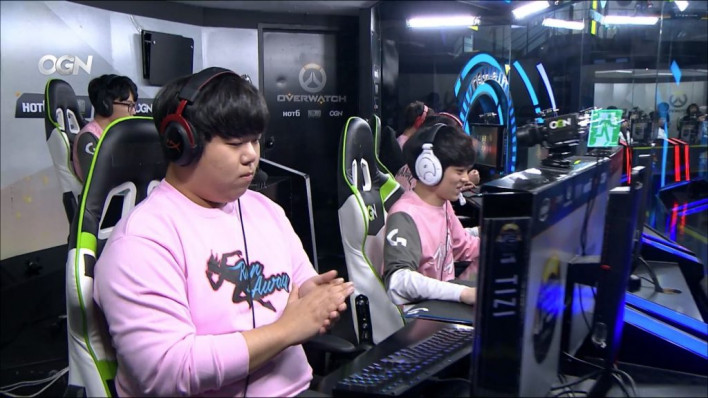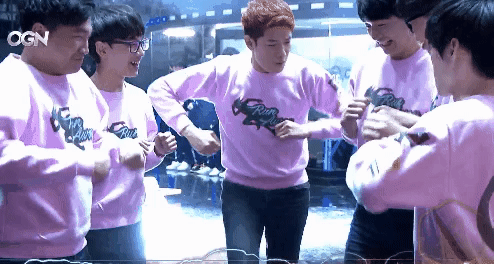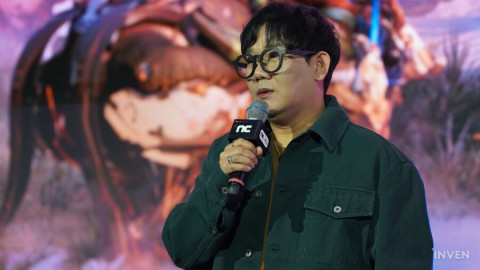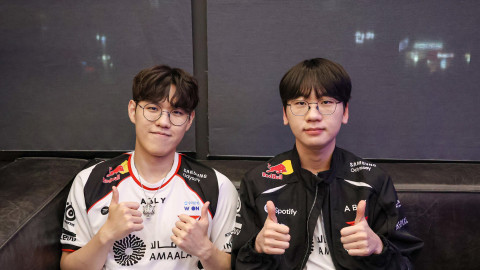
After five years of competing in high-level Overwatch, Korea’s iconic sweater-wearing Overwatch team Runaway shut down their Overwatch division last week.
“The journey of Runaway Overwatch team ends today,” the organization announced in a statement on Twitter. “In 2016, it was a team that started only with passion and challenge, we grew up with the great love and support of our fans. 7 runner-ups and 8 wins.”
The announcement came as a surprise for many fans. After all, Runaway is one of the most popular Overwatch teams in the world and they were one of the OG competitors in the APEX series before OWL even launched. The team was known for their competitive success, as well as their infectious attitudes and pink sweaters.

Their sudden departure left many asking how Runaway became one of the most famous Overwatch orgs in the world, only to unceremoniously topple back to the ground?
We had the chance to speak with Overwatch commentator Achilios, who has commentated on a number of Runaway's games in the past and attended some of their most iconic matches. He spoke with us about what made Runaway an instant success, and what he thinks ultimately brought them to their knees.
The rise of Runaway, Korea’s most iconic T2 Overwatch team
Runaway debuted their first Overwatch roster in October of 2016 at the first offline qualifier for Overwatch APEX Season 1. APEX was a competitive professional Overwatch series that preceded the founding of the Overwatch League. At the time, it was the singular place for high-level offline competitions in Overwatch, so it garnered a lot of attention and provided a training ground for many of the professional OWL players we know and love today.

“Everything from the logo to the pink sweater jerseys made Runaway instantly stand out against the other teams in the APEX era,” professional Overwatch commentator Achilios told me in an interview. “They had a bold personality that was quirky and caused fans to fall in love with the players and staff immediately. There are numerous gifs and reactions used to this day in the Overwatch community, that were brought about by Runner and the rest of the team simply having fun during their matches.”

Runaway found success in Overwatch APEX Season 2, taking second place at the event. Their grand finals match against Lunatic Hai is considered by many to be one of the greatest Overwatch matches to ever be played.
“I was in the audience during their infamous loss at APEX Season 2 vs Lunatic Hai and was simply blown away by all aspects of that final,” Achilios explained. “The production, the hype and tension in the arena were all incredible, but the fans were the real stand out. When I eventually took the reins of APEX/Contenders Korea alongside Wolf, Papasmithy and Atlus, I was always excited to cast Runaway matches, because it meant that it was going to be a packed crowd, regardless of their opponents.”
Runaway once again reached the Grand Finals in APEX Season 4 later on in 2017, but came up short yet again, walking away with 2nd place.
In 2018, the Overwatch Contenders path-to-pro competitions debuted, and in Contenders Season 2 they finally claimed their first win against team KongDoo.

Achilios thought back on that event fondly, saying: “After casting their 2nd Grand Finals loss in the last season of APEX, it was cathartic to cast their first win in Contenders Season 2. I think that will forever be in my top 3 career moments.”
Runaway's second, and final, chapter
After claiming their first win in Contenders, the organization’s entire roster was signed by the Overwatch League expansion team the Vancouver Titans. They would go on to be a very strong team in the Overwatch League, very nearly winning the season title in OWL Season 2.
It is a bittersweet moment anytime a Tier 2 org successfully graduates a member to Tier 1. But graduating an entire roster? That is a historic moment for a Tier 2 org, since it shows that they did exactly their job in developing and cultivating new talent that can compete at the highest level.
Runaway managed to do that, while also providing some of the most energetic and exciting performances of any Overwatch team in the history of the esport.
Runaway signed a new roster in late 2018, including picking up a number of top-tier talents who still compete in the Overwatch League today, including Mayhem player Jun-ki “Yaki” Kim, Fusion player Hee-su “Heesu” Jeong, and Dragons player Lee “LeeJaeGon” Jae-Gon.
With this Roster, Runaway claimed four significant victories in 2019, including winning Korean Contenders 2018 Seasons 3 and Contenders 2019 Season 2. All of the members of that roster left by the end of the year, leaving Runaway to rebuild yet again.
After the departure of their second successful roster, Runaway lost a lot of the momentum they once had, in terms of both personality and success, with personality perhaps being the most important aspect of their team that suffered. They saw mixed results in 2020 but still managed to bring home a number of wins and top placings. But without in-person events, it was hard to feel the hype that carried Runaway to the top.
In 2021, they experienced a pretty poor 5th place finish at KR Overwatch Contenders 2021 Season 1. This would be their last placing in Overwatch, as the team disbanded a month later. The story of Korea's iconic Overwatch org had come to a close.
What does the end of Runaway’s Overwatch team mean for the future of Overwatch’s tier 2 competition?
“I think [Runaway’s departure from Overwatch] is a major blow to the scene,” Achilios explained in our interview. “They were one of the only teams from the APEX era still competing and now they're disbanded. I'm hoping that this is more of an emotional toll rather than one that hurts the overall health of the Contenders scene in Korea.”
While the Contenders scene was waning even before the onset of the pandemic, it is hard to ignore the massive impact that the removal from live events had on many Tier 2 teams. While Runaway saw some respectable results in 2020, that didn’t necessarily translate into revenue, in part due to the essential role that live events played in Runaway’s identity.
“More funding and attention onto the Tier 2 scene is always something that would help, but I think we would still be seeing Runaway in OW if covid was not a factor,” Achilios shared with me. “Their fan interactions, merchandise sales, etc. I assume these were all major factors in keeping the team well funded.”
While the lack of live events has bitten all of esports over the past year, Overwatch’s Tier 2 has suffered immensely under the weight of the pandemic. Nearly every Academy team in North America closed their doors soon after lockdown orders were set in place. The remaining teams in NA and the other regions were forced to move their competition online, where the opportunity to electrify fans is much more limited.
Achilios argued, “More funding and prize money would always be welcomed. But I think one of the biggest boons would simply be the return of audiences; having face-to-face interactions with the players, and the ability to sell merchandise on-site would certainly help a lot of organizations.”
It seems that Overwatch’s Runaway is the latest victim of the global pandemic. Regardless of what happens with Tier 2 Overwatch going forward, Runaway will always be remembered as a legendary team that left a permanent mark on the Overwatch landscape.
-

Aaron is an esports reporter with a background in media, technology, and communication education.
Sort by:
Comments :0





